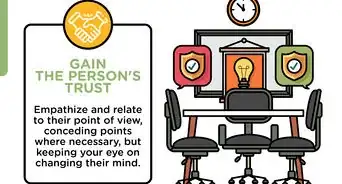This article was co-authored by Chloe Carmichael, PhD and by wikiHow staff writer, Christopher M. Osborne, PhD. Chloe Carmichael, PhD is a Licensed Clinical Psychologist who runs a private practice in New York City. With over a decade of psychological consulting experience, Dr. Chloe specializes in relationship issues, stress management, self esteem, and career coaching. She has also instructed undergraduate courses at Long Island University and has served as adjunct faculty at the City University of New York. Dr. Chloe completed her PhD in Clinical Psychology at Long Island University in Brooklyn, New York and her clinical training at Lenox Hill Hospital and Kings County Hospital. She is accredited by the American Psychological Association and is the author of “Nervous Energy: Harness the Power of Your Anxiety” and “Dr. Chloe's 10 Commandments of Dating.”
This article has been viewed 54,076 times.
Influential people are more likely to be heard and respected, and can effect action and change more readily than others. Influence can be a result of wealth, status, or celebrity, but it’s also a power you can build through everyday action, hard work, networking, and reciprocity. With dedication and focus, you can learn how to be a more influential person.
Steps
Building Your Influence
-
1Pursue your passions. It’s hard to get other people to believe in you and follow your guidance if they don’t feel your passion for the cause or topic. To influence others, you have to be inspired to dedicate yourself to expertise and action—in your career, on an important issue, and so on.[1]
- Influential educators, for instance, usually believe deeply in the importance of their work and are driven to improve the lives of their students. A teacher who’s just there for the paycheck is less likely to be influential on their students’ lives.
-
2Become an expert in your field. Train in something--basketball, coding, social work, accountancy, or whatever your passion may be--that you would like to do for many years. Influential people often have seniority that they’ve built up over the years. Pick hobbies or work that you feel you can sustain with true dedication.[2]
- Younger, less experienced people can become influential, but building up expertise through time and effort is the more likely avenue to influence.
- Pursue a quality education, and increase your knowledge on topics that interest you most.
- Hone your talent. Talent and influence often go hand in hand. You can gain a reputation as someone who should be heard by distinguishing yourself in your work.
Advertisement -
3Be hard-working, reliable, and consistent. You’ll earn the trust and respect of those around you and, in turn, become more capable of influencing them. At work, for example, put in extra hours to get a promotion or earn more respect in your company.[3]
- If, for instance, you’re a member of an activist group pursuing better conditions for low wage workers, give your best effort. Show up to every meeting and event, volunteer to help out in whatever way possible, and share your enthusiasm for the cause.
-
4Build a network of colleagues and collaborators. Loners don’t tend to become influential. Connect with others in your career or field of interest and earn a reputation for reliability and expertise. Over time, you’ll become influential within your network, and possibly in your network members’ networks.[4]
- Seize opportunities to be around other people with similar goals or interests. Attend conferences and parties, or become part of a community organization.
- Use your online presence to build your professional and/or social networks as well. If you have a professional profile on LinkedIn, for instance, use it to build a growing base of contacts within your field.
-
5Work on being engaging and sociable. A respected person who is outgoing usually has more influence than a quiet person, because they are able and willing to make and use connections. Without these connections, it is difficult to transmit influence.[5]
- This doesn’t mean a naturally quiet or introverted person can’t be influential. You will have to find ways to engage with others on a personal level, though.
-
6Exude genuine optimism. Pessimists and naysayers can be influential, but people typically are more eager to be uplifted and inspired. People will usually see through you if you try to manufacture fake enthusiasm, but when you do feel good about something, let it show![6]
- An influential coach is more likely to be encouraging players and talking about how it’s “a great day for a ballgame” instead of harping on what the team did wrong last game.
-
7Stay in touch with your goals. Regularly ask yourself, “Why do I want to be influential?” and “What kind of influence do I want to have?” Determine what you want to gain from social situations, board meetings, meetings with managers, and other affiliations. Work toward those goals to keep your influential focus on track.[7]
- If you’re looking to be influential in order to gain fame, wealth, or power, accept that there are no guarantees and that you may never be satisfied.
- If you’re trying to become influential in order to effect positive change, you might also never be fully satisfied with your results, but you may derive more pride and joy from your efforts.
EXPERT TIP"When you're thinking about how to grow your career, look at how it fits with your personal life. That will help you balance your goals."
Chloe Carmichael, PhD is a Licensed Clinical Psychologist who runs a private practice in New York City. With over a decade of psychological consulting experience, Dr. Chloe specializes in relationship issues, stress management, self esteem, and career coaching. She has also instructed undergraduate courses at Long Island University and has served as adjunct faculty at the City University of New York. Dr. Chloe completed her PhD in Clinical Psychology at Long Island University in Brooklyn, New York and her clinical training at Lenox Hill Hospital and Kings County Hospital. She is accredited by the American Psychological Association and is the author of “Nervous Energy: Harness the Power of Your Anxiety” and “Dr. Chloe's 10 Commandments of Dating.”
Chloe Carmichael, PhD
Licensed Clinical Psychologist Chloe Carmichael, PhD
Chloe Carmichael, PhD
Licensed Clinical Psychologist
Utilizing Your Influence
-
1Embrace leadership opportunities. Become useful to people, and soon they will look to you for advice. Being an adviser is being an influencer.[8]
- This is especially important if you do not already have status or prestige. Being a leader is a great way to gain the power to influence others.
- Volunteer to be the team leader for a tough work project, or become an officer with your social group. Never turn down a chance to show off your leadership skills.
-
2Engage your interpersonal network regularly. This can be as simple as saying “hi” to your colleagues in the office every morning, or striking up a conversation in the breakroom instead of eating lunch at your desk. Your ability to stay in touch with people will make you more socially powerful. Find little ways to keep in contact and open the door to your influence.[9]
- Call an old friend once a week. Do it just to catch up, instead of only calling when you need a favor.
- Join and actively engage with charitable organizations that your friends are involved with.
- Compose personalized, thoughtful, hand-written thank-you and holiday notes to your friends and colleagues.
- Start a yearly event, such as a summer barbecue, a company holiday party, or a Halloween mixer where you invite people from your social and business circles.
-
3Grow and utilize your social media network. Having a large number of Twitter followers or Facebook friends might be seen as proof of your potential influence. Engage with these contacts regularly in order to maintain an open conduit for your influence.[10]
- Respond to posts and requests, and share your informed perspectives in a friendly manner.
- Keep up to date with social media networks as they wax and wane in popularity, especially if you are looking to influence younger people.
- Also make sure you are a part of networks that are appropriate for your position and goals. Start a LinkedIn profile, for instance, if you are gaining influence in the business world.
-
4Use existing connections to make new connections. Always look for ways to add to your network of friends, colleagues, and followers. Whether in person or online, keep track of names and key information about new people. This will enable you to build a rapport with them and potentially become influential.[11]
- For example, join alumni groups for the university you graduated from. Becoming actively involved in these is a great way to expand your network and possible influence.
-
5Do favors and ask for favors. You will not be able to influence others if you are afraid to ask them for things. Likewise, you’ll lose any influence you have if you always turn down requests for assistance. Start trading little favors early, so that you can influence important decisions later on.[12]
- As you start doing favors and building connections based on reciprocity, your influence will likely grow.
- For instance, offer to help out a colleague with a difficult project, then ask them for a bit of help in turn.
-
6Adapt to changing circumstances. You might have built up influence through your leadership position at work, then have a corporate restructuring sweep it away. Or, your online influence may decline as users migrate to other platforms or technologies. Never assume that influence is permanent, or that what works today will work tomorrow.[13]
- It takes just as much effort to remain influential as it does to become influential. You have to keep demonstrating passion and expertise, building networks, and establishing reciprocal connections.
Using Influential Tactics in Conversations
-
1Aim to be likeable. Smiling, laughing, and complimenting are great ways to open the door to influencing people. If people are comfortable around you, they are more likely to take your inspiration or guidance to heart.[14]
- Effective salespeople put potential customers at ease right away with charm and tact. In a similar manner, you need to put others at ease in order to “sell” them on your wisdom and leadership qualities.
- Practice looking and acting likeable during interactions in front of the mirror, or with good friends or family members.
-
2Make eye contact during conversation. Look at people as you talk to them, and as they speak to you. Nod and use other visual or verbal affirmations to show that you are listening.[15]
- Keep eye contact more often than not, but don’t stare at the person the whole time. Look away briefly every 15 seconds or so, then return your gaze to them.
-
3Repeat important information to show you understand and have made connections. Quickly summarizing what the other person has just said to you proves that you’ve been listening and enhances the connection being made. People won’t be influenced by you if it seems like you can’t even be bothered to pay attention to them for a few seconds.[16]
- After they finish speaking, say something like, “So, you feel like HR isn’t responsive enough to the needs of working mothers,” then transition into your thoughts on the matter.
-
4Learn to name-drop judiciously. Successful name-dropping means suggesting connections or meetings within your circle. If you are at a party and you want to meet new people or introduce people, use the names of people that are already in the circle.[17]
- Don’t name-drop people outside of the social circle. Name-dropping can quickly change to bragging, if you suggest you know politicians, celebrities or musicians that aren’t relevant to your contacts.
- Good name-dropping might be: “Oh, I need to introduce you to Don. He’s right over there, and he’s also an environmental attorney.”
- Bad name-dropping might be: “You know, when I was an intern for Senator Brown…”
-
5Find common ground with other people. During the course of any conversation, you should aim to connect through a shared interest, hobby, or experience. You can reference it to establish common ground going forward.[18]
- This doesn’t mean you should limit yourself to a network of people who are as much like you as possible. Embrace diversity and differences, and seek out elements of commonality through conversation and connection.
- The common ground might be something as trivial as a shared fandom for a sports team. Or, you might both be passionate about a political cause, despite some differences in the particulars of your views.
-
6Follow up on contacts and conversations. You’ll increase your chances of influencing someone if you give them a follow-up call or other form of contact. Depending on the circumstances, you may want to see if they have any questions, or ask them how things turned out. Basically, you want to demonstrate your ongoing interest and availability.[19]
- However, make sure you don’t end up nagging them. A single follow-up a few days afterwards is usually sufficient, but try to follow their cues regarding their interest in follow-up conversations.
- You might simply call and say something like, "Hi, John, I just wanted to check in and see how that meeting went that we were talking about the other day. Did you get to mention those sales figures we discussed?"
References
- ↑ https://www.forbes.com/sites/markfidelman/2013/09/18/25-things-influential-people-do-better-than-anyone-else/#1c7205743397
- ↑ https://www.forbes.com/sites/markfidelman/2013/09/18/25-things-influential-people-do-better-than-anyone-else/#1c7205743397
- ↑ https://www.forbes.com/sites/markfidelman/2013/09/18/25-things-influential-people-do-better-than-anyone-else/#1c7205743397
- ↑ https://www.forbes.com/sites/markfidelman/2013/09/18/25-things-influential-people-do-better-than-anyone-else/#1c7205743397
- ↑ https://www.inc.com/peter-economy/7-highly-effective-habits-to-become-the-most-influential-person-in-the-room.html
- ↑ https://www.inc.com/peter-economy/7-highly-effective-habits-to-become-the-most-influential-person-in-the-room.html
- ↑ https://www.forbes.com/sites/markfidelman/2013/09/18/25-things-influential-people-do-better-than-anyone-else/#1c7205743397
- ↑ https://www.entrepreneur.com/slideshow/307448
- ↑ https://www.forbes.com/sites/markfidelman/2013/09/18/25-things-influential-people-do-better-than-anyone-else/#1c7205743397
- ↑ https://www.entrepreneur.com/slideshow/307448
- ↑ https://www.success.com/5-ways-to-be-more-influential/
- ↑ https://www.forbes.com/sites/markfidelman/2013/09/18/25-things-influential-people-do-better-than-anyone-else/#1c7205743397
- ↑ https://www.success.com/5-ways-to-be-more-influential/
- ↑ https://www.inc.com/peter-economy/7-highly-effective-habits-to-become-the-most-influential-person-in-the-room.html
- ↑ https://www.inc.com/peter-economy/7-highly-effective-habits-to-become-the-most-influential-person-in-the-room.html
- ↑ https://www.entrepreneur.com/slideshow/307448
- ↑ https://www.success.com/5-ways-to-be-more-influential/
- ↑ https://www.success.com/5-ways-to-be-more-influential/
- ↑ https://www.forbes.com/sites/markfidelman/2013/09/18/25-things-influential-people-do-better-than-anyone-else/#1c7205743397
About This Article
If you want to be influential, focus on pursuing your passion so you can inspire other people with your expertise and dedication. For example, if you like coding, you can take a course on the subject to gain more knowledge and hone your talent. By working hard at your passion, you'll be able to earn the trust and respect of others, which makes it easier to influence them! Another way to build your influence is to be optimistic since people are drawn to positivity. Instead of being a naysayer, try to look to the bright side to lift up those around you. Since it’s easier to influence people who are comfortable around you, you can make yourself more likable by smiling and making eye contact during conversations. For more tips from our Psychology co-author, including how to grow your social media network to increase your influence, scroll down!














































































